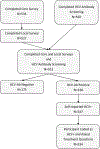Hepatitis C continuum of care and utilization of healthcare and harm reduction services among persons who inject drugs in Seattle
- PMID: 30611979
- PMCID: PMC6440747
- DOI: 10.1016/j.drugalcdep.2018.11.026
Hepatitis C continuum of care and utilization of healthcare and harm reduction services among persons who inject drugs in Seattle
Abstract
Background: To describe the "continuum of care" for hepatitis C virus (HCV) and related health service utilization among persons who inject drugs (PWID) in the Seattle metropolitan area.
Methods: The study analyzed data from the 2015 National HIV Behavioral Surveillance system focused on PWID, which included local questions on HCV treatment and testing. We calculated respondent driven sampling (RDS)-adjusted percentages of participants who had completed each step of the care continuum and compared healthcare harm reduction services among participants who were HCV + vs. HCV- using bivariate analyses.
Results: 513 PWID were screened for HCV antibodies (Ab). Of those, 59.7% were HCV Ab+. Among those HCV Ab+, 86.4% had been tested for HCV at least once; 69.9% reported a previous diagnosis. Of those diagnosed, 55.9% had received a confirmatory test, 17.2% had ever received any medications for HCV, and 7.2% had completed treatment. The majority of HCV Ab + participants had seen a health care provider in the past 12 months (85.6%).
Conclusions: There is a large gap between HCV screening and treatment among Seattle area PWID.
Keywords: Continuum of care; Hepatitis C; Persons who inject drugs.
Copyright © 2018. Published by Elsevier B.V.
Figures


References
-
- A.A.S.L.D.-I.D.S.A., Recommendations for testing, managing, and treating hepatitis C http://www.hcvguidelines.org. Accessed on 6/25/18.
-
- Al-Tayyib AA, Thiede H, Burt RD, Koester S, 2015. Unmet health care needs and hepatitis C infection among persons who inject drugs in Denver and Seattle, 2009. Prev. Sci 16, 330–340. - PubMed
-
- Aleccia J, 2016. Judge orders Washington Medicaid to provide lifesaving hepatitis C drugs for all. Seattle Times May/28/2016
-
- Anderson ES, Galbraith JW, Deering LJ, Pfeil SK, Todorovic T, Rodgers JB, Forsythe JM, Franco R, Wang H, Wang NE, White DAE, 2017. Continuum of care for hepatitis C virus among patients diagnosed in the emergency department setting. Clin. Infect. Dis 64, 1540–1546. - PubMed
Publication types
MeSH terms
Grants and funding
LinkOut - more resources
Full Text Sources
Medical
Miscellaneous

